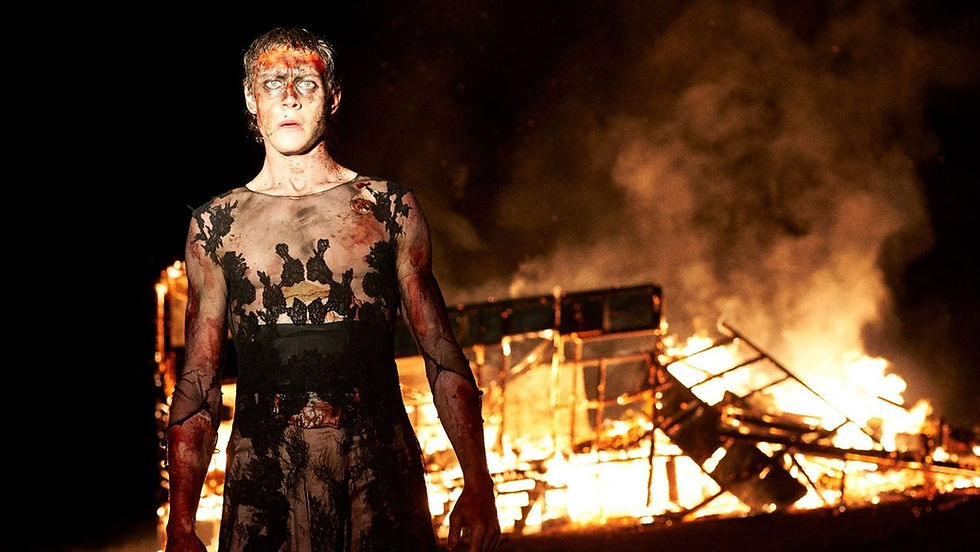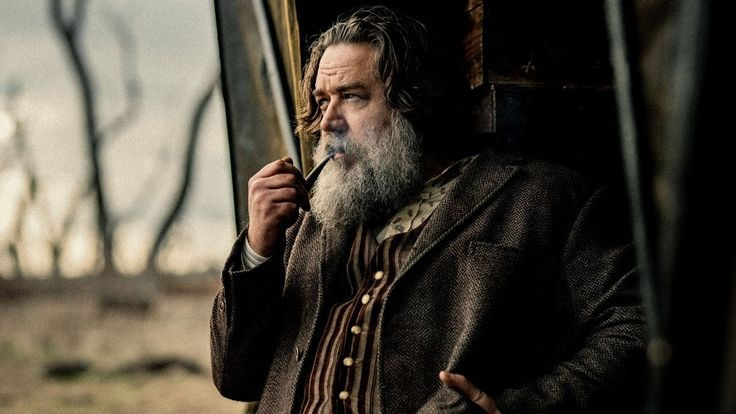
(Release Info London schedule; February 28th, 2020, Picturehouse Central,
Piccadilly Circus, Corner of Great Windmill Street and, Shaftesbury Ave,
London W1D 7DH, United Kingdom, 12:55 15:45 18:35 21:25)
https://film.list.co.uk/listing/1517549-true-history-of-the-kelly-gang/
"True History Of The Kelly Gang"
Legendary outlaw Ned Kelly (George MacKay) leads a band of rebel warriors to wreak havoc on their oppressors in this gritty and veracious western thriller.
Set amidst the grueling badlands of 19th-century Australia, legendary outlaw Ned Kelly (Orlando Schwerdt) grows up under the bloody and uncompromising rule of 'The English'. Food is scarce, survival is filled with daily strife, and every opportunity the colonizers take to make their victims feel powerless is inflicted with searing brutality. In a desperate attempt to prime him for rebellion, Ned Kelly’s mother Ellie (Essie Davis), sells him off into the hands of the notorious bushranger Harry Power (Russel Crowe), where the young bandit discovers he comes from a line of warriors called 'The Sons Of Sieve'. Fueled by his roots and a voracious appetite for revenge, Ned Kelly leads an anarchist army to wreak havoc on their oppressors in one of the most audacious attacks the country has ever seen. Based on the novel by Peter Carey, "True History Of The Kelly Gang" brings a revolutionary twist to an iconic piece of folklore.
The film spans two periods of Ned Kelly’s life. Ned Kelly wants to be a better man and wants to be great. Also in the book you could feel and understand that Ned Kelly is a writer, he isn't’t just some kind of ruffian and that there's something incredibly sophisticated about him. He has enormous potential, and there's a creative side to him that could have easily seen him as our 'Prime Minister' as opposed to our most famous bushranger. It's also important to be able to transform that innocence to the eventual violent, brutal and unforgiving man. It's not going to be 'Mad Max'. It’s not going to be 'Walkabout'. It’s not going to be 'Connor McGregor'. It’s just going to be like the tiniest flicks of colours, and then you just make what you want. We’ll all make what we want. Ned Kelly has become something to a culture, and has a meaning and an identity that's tied up in the folklore surrounding him. Joe Byrne (Sean Keenan) has a kind of beautiful, charming, loyal, very Australian beauty about him that seemed very timeless. Joe is of 'Irish' background and was mistreated by 'The English'. Byrne has grown up next to a community of 'Cantonese' miners and is subsequently fluent in 'Cantonese' and an opiate addict. It’s assumes in the film that he meets Ned in prison, their shared cultural backgrounds initiating a bond. Meeting Ned is a big turning point for Joe. Joe sees something in this man that he’d seen in a lot of others around him. And while he’s an addict, he sees things really clearly. He’s a bit of a fatalist and a nihilist, while Ned is so full of hope and has these massive dreams. Joe sees that in him and is attracted to the purity of that.
Dan (Earl Cave) is Ned's brother. They're almost symbiotic. They've taught each other a lot, stole horses together, got tattoos together and had to grow up in this sort of tough atmosphere with everyone hating them. The brothers that Ned and Dan would have been, if Ned didn’t go to prison. Steve (Louis Hewison) is a quiet reticent guy, and then you hear stories from the family who say they use to call him the demon when he was young. He brings out both those sides, the gentle hippie and then the side that becomes at home in a film like 'Easy Rider. The character of Ellen Kelly is complex, a mother but also a survivor. She’s somebody who’s deeply yoked to her family and has a strong sense of family. But there’s a duality in her, she’ll do anything to survive, including using her own children to do that. Ellen is such a firecracker. She’s a fantastic mother but she's a wildebeest and she has so many elements and angles to her, she’s all about life and all about death. And she loves her children and, particularly, her sons, fiercely but she's a survivor and she’ll do anything to survive. Their relationship is incredibly powerful, controlling and manipulative but a deeply loving relationship, that the mother has for her boy. It happens a lot when suddenly there are really ambitious children who want to travel or have huge ambitions, that there can be a tendency for that to be fearful for parents, to want to kind of bring those ambitions back to them for fear of losing them. That becomes a kind of potent motivation to lead to the end of the film and understand the context of this massacre and siege at the end of the film.
Young Ned is somebody who yearns for something else to kind of break away from the destiny that’s mapped out for them, of a future of crime and prison; it’s a really familiar path for 'The Irish' in Australia in that period. In that story is a kind of sweetness that you’re looking for but you’re also looking for somebody who has that edge and has the possibility of what they’re going to become. Next to 12-year-old Ned it needs an authority. Harry Power is an infamous bushranger. He's the greatest bush ranger in Australia. In the film Harry Power says to little Ned 'always make sure you’re the author of your own story because 'The English' will always take it and fuck it up' and that sort ingrains in little Ned that words matter and writing matters and documentation matters. You also need a sense that he's no longer Harry Power anymore and that he's getting towards the end and that there's a kind of tragedy in that; it's feels soppy. As mentors go he’s a dangerous one but there's actually a lot of love in Harry and a lot of the things that he’s passing on to Ned are about the reality of the world. When we reach older Ned’s life, two seminal characters in his trajectory are Constable Fitzpatrick (Nicholas Hoult) and Mary Hearn (Thomas McKenzie). Fitzpatrick is a man who’s been taken away from this sophisticated land of 'United Kingdom', arriving in Australia and sort of looking around and thinking ‘my god, where am I going to get my brandy'. He's mischievous and perverse. Fitzpatrick always has attraction to Ned, which is something forbidden. He has to be a certain sort of class and authority and Ned represented to him a kind of wildness, masculinity, a rebellion and spirit that he's attracted to. Ned is curious of Fitzpatrick and there's a sophistication he admires. Fitzpatrick actually really wanting to be friends with Ned and being intrigued by that family, their closeness and environment and what they're, and also probably being quite lonely. It's through Fitzpatrick that Ned meets Mary Hearn. Mary provides moments of a sort of clarity, an if only Ned would just leave with Mary moment in the unfolding of what's heading sharply towards tragedy.
Bad characters and good characters are sharing the same bed in those times. What's happening then and the difference between cops and robbers is very thin. There's genocide happening in Australia and crimes of enormous proportions committed by authority so the line of what's good and what's right is obviously a very different conversation to what it's to now. An incredible piece of landscape called 'The Winton Wetlands' are the playground for 'Kelly Selection'. It's a meeting site where hundreds of Aboriginal peoples have met and that in Kelly’s time it would have been a supermarket, providing shelter, food and water. It has a varied history environmentally, having been damned, then dried up and subsequently all the trees started dying, although it's now also an amazing habitat for flora and fauna. While currently under restoration, it presents a gothic and scarred backdrop for 'The Kellys’ home. The landscapes the characters go through are incredibly varied in the film. There's something about going up and seeing Marysville, and 'The Gang' would’ve ridden through there, the landscape is extraordinary now after the fires, and there's a tragedy about that place and a beauty about it, that seemed to encapsulate this kind of story. Australia in the 70’s and 80’s, especially on men, is really similar to the silhouette in the 1870’s. It's taking a favourite period in Australian music, and art, and fashion and combining it with the 1870’s and seeing where that sweet spot hit. That whole kind of era becomes a massive influence for the gang. You can look at them and go it’s just a punch of skaters or it’s just a young kind of punk band just starting out. All of the references are of a particular period of Australian music and art, that's extremely exciting and fortunately the four of them are really attracted to those references
There's a timelessness in Peter Carey’s novel as being the attraction to the story but also the springboard for not just the visual and character references, but the wider themes that can be explored in "True History Of The Kelly Gang". The novel is the quintessential take on the overgrown myth that Ned Kelly is to this country. It’s brutal. It’s visceral. There’s kind of a darkness in the violence to it but there’s also a very strong emotional through-line that’s really clear in the book, between that journey from boy to man. Ned’s been very much portrayed in the past as a hero, and the film is interested in characters on the wrong side of the law in terms of how they got there and why. A huge part of this film is about what's true and what's not and your history and your story and what you've done in your life can be easily stolen from you and recreated. The film shows Kelly as he was in this story, both the good and the bad, and let others decide. Some people will still call him a hero, and some people will still call him a cop killer, and that’s not for us to say. You don’t really know what’s said between those walls, between those men, so you've to invent. There's been a lot in the media about terrorism and people being persecuted because of their culture and their background; where they’re from. And when you put up with that persecution long enough, you decide that that’s enough and you decide to burn the world. On the flip side of the relevance to the current world, the film points to the danger of viewing characters with today’s societal worldview.

.png)